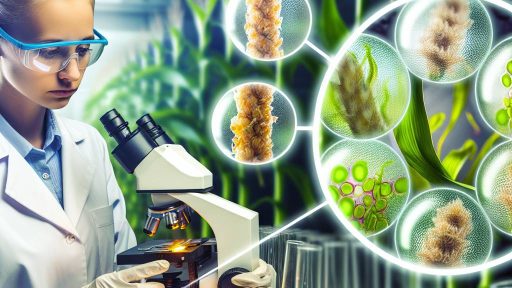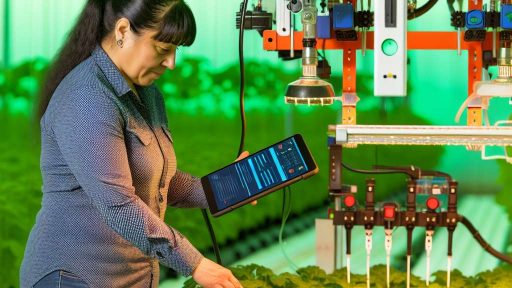Introduction to Biotech-Based Fertilizers
Biotech-based fertilizers are revolutionary agricultural products.
They significantly enhance plant growth through advanced biological processes.
These fertilizers utilize genetically modified microorganisms or plant extracts.
As a result, they improve nutrient availability and uptake in plants.
Definition and Overview
Biotech-based fertilizers represent a blend of biotechnology and agriculture.
These products aim to optimize soil health and plant nutrition.
They facilitate sustainable farming practices and reduce chemical inputs.
Moreover, they enhance crop yields and improve food quality.
Mechanisms of Action
Biotech-based fertilizers work by enhancing soil microbial communities.
This boosts nutrient cycling and improves soil structure.
Additionally, they can fix nitrogen or solubilize phosphorus.
Consequently, plants access essential nutrients more efficiently.
Types of Biotech-Based Fertilizers
- Microbial fertilizers contain beneficial bacteria or fungi.
- Enzyme-based fertilizers utilize specific enzymes to break down organic matter.
- Plant growth-promoting rhizobacteria (PGPR) stimulate plant growth.
- Bioorganic fertilizers combine organic matter with beneficial microorganisms.
Benefits of Biotech-Based Fertilizers
These fertilizers offer numerous advantages for agriculture.
Firstly, they promote sustainable farming practices.
Secondly, they reduce environmental pollution caused by synthetic fertilizers.
Transform Your Agribusiness
Unlock your farm's potential with expert advice tailored to your needs. Get actionable steps that drive real results.
Get StartedFurthermore, they enhance soil biodiversity through microbial activity.
Ultimately, they support the health of ecosystems while boosting productivity.
Types of Biotech-Based Fertilizers
Microbial Fertilizers
Microbial fertilizers contain beneficial microorganisms.
These microorganisms enhance nutrient availability in the soil.
They improve root development and plant growth.
Moreover, they can help suppress plant diseases.
Common types include rhizobium and mycorrhizal fungi.
For instance, rhizobium fixes nitrogen for leguminous plants.
Meanwhile, mycorrhizal fungi improve phosphorus uptake.
Bio-organic Fertilizers
Bio-organic fertilizers combine organic materials and microbial cultures.
They enrich the soil with essential nutrients and organic matter.
This promotes a healthy soil ecosystem.
Compost and vermicompost are popular examples.
They improve soil structure and water retention.
Additionally, they promote the growth of beneficial soil organisms.
Bio-organic fertilizers reduce the need for chemical inputs.
Engineered Nutrients
Engineered nutrients are designed to meet specific plant needs.
They often provide a targeted release of nutrients.
This approach maximizes nutrient uptake efficiency.
Examples include controlled-release fertilizers and slow-release coatings.
These products can support better crop yields over time.
They also help minimize nutrient losses to the environment.
Consequently, they contribute to sustainable agricultural practices.
The Science Behind Biotech Fertilizers
Understanding Biotech Fertilizers
Biotech fertilizers have altered the agricultural landscape significantly.
Showcase Your Farming Business
Publish your professional farming services profile on our blog for a one-time fee of $200 and reach a dedicated audience of farmers and agribusiness owners.
Publish Your ProfileThese fertilizers leverage biological processes for better plant nutrition.
They often contain beneficial microorganisms or organic materials.
As a result, farmers see enhanced crop yields and improved soil health.
Mechanisms at the Cellular Level
Biotech fertilizers work by improving nutrient uptake in plants.
They enhance microbial activity within the soil ecosystem.
This process leads to increased availability of essential nutrients.
Microbial Interaction
The incorporation of beneficial microbes establishes symbiotic relationships.
These microbes facilitate the breakdown of organic matter.
Consequently, nutrients become more accessible to plant roots.
In addition, some microbes produce natural growth hormones.
This boosts plant growth and resilience against diseases.
Enhanced Nutrient Utilization
Biotech fertilizers enable plants to utilize nutrients more efficiently.
They help improve nitrogen fixation in legumes.
This process significantly reduces the need for synthetic fertilizers.
Furthermore, enhanced phosphorus solubilization aids nutrient uptake.
Environmental Benefits
Using biotech fertilizers contributes to sustainable agriculture practices.
They reduce chemical runoff into water supplies.
This ultimately improves overall soil and water quality.
Moreover, these fertilizers promote biodiversity in agricultural settings.
Climate Resilience
Biotech fertilizers help plants adapt to changing climate conditions.
Stronger plants withstand environmental stresses, such as drought or flooding.
This resilience supports long-term agricultural sustainability.
Learn More: Integrating Blockchain To Boost Farm-to-Fork Supply Chain Transparency
Benefits of Biotech-Based Fertilizers
Enhanced Nutrient Uptake
Biotech-based fertilizers significantly improve nutrient uptake in plants.
This enhancement occurs due to the presence of beneficial microorganisms.
These microorganisms work symbiotically with plant roots, increasing absorption efficiency.
As a result, plants can access critical nutrients more effectively.
Moreover, this improvement often leads to increased plant growth and yield.
Soil Health Improvement
These fertilizers contribute to enhanced soil health over time.
They promote the growth of beneficial soil microorganisms.
Consequently, this activity enhances soil structure and fertility.
Healthy soil retains moisture and nutrients better than degraded soil.
Additionally, improved soil health reduces the need for synthetic inputs.
Environmental Benefits
Utilizing biotech-based fertilizers can lead to environmental sustainability.
They reduce the risk of runoff, which can pollute waterways.
Moreover, these fertilizers can lower greenhouse gas emissions from agricultural practices.
This reduction helps in combatting climate change effectively.
Furthermore, these fertilizers promote biodiversity within the soil ecosystem.
Economic Advantages for Farmers
Farmers often experience economic benefits with biotech-based fertilizers.
Increased yield means higher profits for crop producers.
Showcase Your Farming Business
Publish your professional farming services profile on our blog for a one-time fee of $200 and reach a dedicated audience of farmers and agribusiness owners.
Publish Your ProfileFarmers can also reduce input costs associated with chemical fertilizers.
This improves the overall profitability of sustainable farming practices.
Additionally, these fertilizers may increase access to premium markets.
Explore Further: Sustainable Farming Practices Using Controlled Environment Systems
Comparative Analysis: Biotech Fertilizers vs. Traditional Chemical Fertilizers
Definition and Composition
Biotech fertilizers utilize organisms and natural processes for fertilization.
They often contain beneficial microorganisms or enzymes.
In contrast, traditional chemical fertilizers feature synthetic compounds.
These compounds primarily provide nutrients like nitrogen, phosphorus, and potassium.
Environmental Impact
The environmental impact of biotech fertilizers tends to be lower.
They help improve soil health over time.
Moreover, they reduce the risk of water pollution.
Conversely, traditional chemical fertilizers can lead to nutrient runoff.
This runoff often causes harmful algal blooms in water bodies.
Efficiency and Nutrient Release
Biotech fertilizers release nutrients more gradually.
This slow release ensures sustained plant growth.
Additionally, they often enhance nutrient absorption by roots.
Traditional fertilizers can provide a quick nutrient boost.
However, they may result in nutrient leaching if overused.
Cost-effectiveness
Biotech fertilizers may initially have higher costs.
However, their long-term benefits can balance the investment.
In contrast, traditional fertilizers are often cheaper upfront.
This price difference might attract short-term buyers.
Ultimately, the choice depends on long-term goals and farming practices.
Compatibility with Organic Farming
Biotech fertilizers align well with organic farming principles.
They support sustainable practices and biodiversity.
Conversely, traditional chemical fertilizers are generally forbidden in organic farming.
Farmers pursuing organic certification must avoid synthetic inputs.
Public Perception and Acceptance
Consumer acceptance of biotech fertilizers can be mixed.
Some view them as innovative solutions to agricultural challenges.
Others remain skeptical due to concerns about genetically modified organisms.
On the other hand, traditional fertilizers enjoy widespread acceptance.
Farmers often use them due to proven efficacy.
Discover More: Solar Irrigation Solutions for Efficient Water Use

Environmental Impact: Reducing Chemical Runoff and Promoting Sustainability
Understanding Chemical Runoff
Chemical runoff occurs when fertilizers enter waterways.
This runoff poses a significant environmental problem.
It leads to harmful algal blooms and pollution.
Consequently, aquatic ecosystems suffer greatly.
Biotech-Based Fertilizers and Their Benefits
Biotech-based fertilizers reduce the need for traditional chemicals.
These fertilizers enhance soil health and productivity.
They utilize naturally occurring microorganisms to promote growth.
Showcase Your Farming Business
Publish your professional farming services profile on our blog for a one-time fee of $200 and reach a dedicated audience of farmers and agribusiness owners.
Publish Your ProfileAs a result, they minimize harmful toxins in the environment.
Promoting Sustainability Through Usage
Adopting biotech fertilizers supports sustainable agriculture.
This approach lowers the carbon footprint of farming.
Moreover, it promotes biodiversity in farming systems.
Healthy soils contribute to a more resilient ecosystem.
Implementing Best Practices
Farmers should consider the timing of fertilizer applications.
Applying fertilizers during optimal weather conditions can reduce runoff.
Additionally, integrating cover crops can prevent soil erosion.
These practices collectively maintain soil integrity and water quality.
Case Studies and Real-world Applications
A local farm in Oregon adopted biotech fertilizers.
This transition resulted in reduced runoff by 30%.
Nearby water bodies showed improvement in water quality.
Overall, the farm reported higher crop yields as well.
The Future of Sustainable Agriculture
As awareness grows, more farmers will adopt biotech solutions.
This shift can lead to significant environmental benefits.
Governments and organizations must support sustainable initiatives.
Ultimately, the goal is a balanced relationship with nature.
Gain More Insights: Benefits Of Genetically Modified Crops For Modern Farmers
Case Studies: Successful Applications and Farmers’ Experiences with Biotech Fertilizers
Introduction to Biotech Fertilizers
Biotech fertilizers revolutionize agricultural practices worldwide.
They enhance soil health and crop productivity effectively.
Moreover, farmers report improved sustainability using these products.
Real-World Success Stories
Many farmers have embraced biotech fertilizers with substantial benefits.
For instance, Maria Gonzalez operates a vegetable farm in Texas.
She switched to biotech fertilizers two years ago.
Maria noticed a significant increase in her tomato yield.
This jump can be attributed to improved nutrient uptake.
Farmers’ Testimonials
Farmers often share their positive experiences with biotech fertilizers.
James Reynolds, a corn producer in Iowa, reports similar success.
He states that biotech fertilizers reduced his dependency on traditional options.
As a result, his operational costs have decreased dramatically.
Comparative Studies on Efficacy
In California, a comparison study highlighted the benefits of biotech fertilizers.
Research showed that crops fertilized with biotech products outperformed conventional ones.
Increases in both yield and nutrient density were documented.
Furthermore, soil health improved significantly over the growing season.
Long-term Impact on Farming Practices
The transition to biotech fertilizers fosters better agricultural practices.
Farmers reduce chemical runoff, thus protecting local ecosystems.
This approach also promotes a healthier food supply.
Farmers like Sarah Chen express enthusiasm for the long-term benefits.
Challenges Faced by Farmers
Despite these benefits, farmers face challenges in adoption.
Some express concerns about the cost of biotech products.
Showcase Your Farming Business
Publish your professional farming services profile on our blog for a one-time fee of $200 and reach a dedicated audience of farmers and agribusiness owners.
Publish Your ProfileOthers worry about regulatory hurdles affecting their usage.
Nevertheless, many believe the long-term advantages far outweigh the initial costs.
Future Outlook for Biotech Fertilizers
The future looks promising for biotech fertilizers in agriculture.
Increased awareness of their benefits continues to grow among farmers.
As more success stories emerge, adoption rates are expected to rise.
Consequently, these innovations may play a crucial role in global food security.
Future Trends in Biotech Fertilizers: Innovations and Research Directions
Advancements in Microbial Solutions
New microbial technologies significantly enhance crop yield and soil health.
Researchers are developing bio-inoculants tailored for specific crops.
This personalization can optimize nutrient uptake and reduce chemical dependency.
Companies like GreenHarvest Innovations lead these innovations.
They focus on utilizing beneficial microorganisms to improve soil structure.
Increased Use of Bioactive Compounds
Bioactive compounds play a crucial role in sustainable agriculture.
These products stimulate plant growth and improve stress resistance.
Research shows their potential to enhance nutrient availability in soil.
Prominent organizations are collaborating to refine these compounds.
This approach aims to increase the efficacy of traditional fertilizers.
Integration of Technology and Data Analytics
Advanced technology streamlines the application of biotech fertilizers.
Data analytics provides insights into soil health and crop needs.
Farmers can make informed decisions based on real-time data.
Tech companies are developing apps to monitor fertilizer effectiveness.
This trend promotes precision agriculture practices across the industry.
Regulatory and Environmental Considerations
Environmental regulations are evolving with biotechnological advancements.
Compliance ensures that biotech fertilizers are safe and effective.
Research focuses on assessing ecological impacts and sustainability.
Organizations must adapt to changing regulations while innovating.
This balance can ensure long-term viability in agricultural practices.
Collaboration for Future Innovations
Collaboration among stakeholders fosters innovation in biotech fertilizers.
Partnerships include academia, industry, and government agencies.
Such collaborations can accelerate research and product development.
Joint efforts enhance knowledge sharing and resource allocation.
This teamwork is vital to advancing sustainable agricultural practices.




